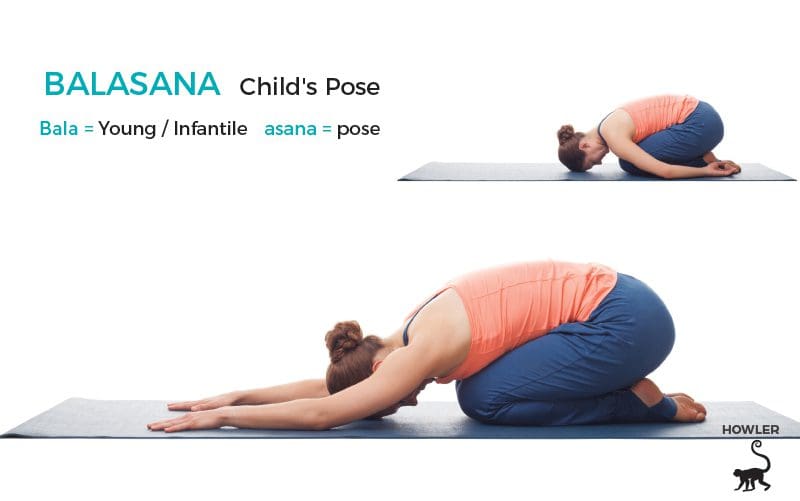
Yogapedia: Balasana Child’s Pose
Balasana, or child’s pose, is a yoga posture that offers physical and mental relief for many practitioners. As a calming posture, it provides a feeling of being held and supported by yourself and the earth, awakening you to the movement and sound in rhythm with your breath. In this space, intimacy between your body, mind and emotions can be nurtured.
Balasana is classified as a resting posture, which can mislead new practitioners to think of it as an easy posture. But as deeper observation of its elements reveal, the actions of many muscles come into play. For example, the extensors of the spine must lengthen to bring the sitting bones to the heels and the forehead to the floor. Gravity plays an important part, drawing the yielding body deeper into the posture and causing the yogi to actively surrender breath by breath.
Benefits of child’s pose
Physically
Stretches the hips, thighs and knees.
Depending on knee position, it rounds and stretches the back, including the lower back.
Activates the parasympathetic nervous system, which lowers blood pressure and heart rate. Together with breath, gives a massage to the organs.
Mentally
The greatest gift of this tender posture is teaching you to let go of resistance and open yourself to receptivity.
Emotionally
Balasana provides a space to experience emotional relief and sense of surrender, just like a child resting on the mother’s chest.
To be mindful
Avoid practicing if you have diarrhea or if you feel any discomfort on your abdomen. Squeezing your belly as you fold forward can cause pain. Also avoid this posture if you have any pain or injury on your knee.
How to do child’s pose
Start on your knees and sit back on your heels, with hands facing up placed on your thighs.
Close your eyes and take a moment to become more deeply aware of your breath and your body. Start by sensing the points of your body that are in contact with the earth like the top of the feet, calves and knees. Note how the spine starts lengthening as you move your attention up to the heart, shoulders and chest.
If you want to round and lengthen your spine, keep knees together. When you fold forward, your spine will be more rounded as you reach your forehead to the floor and sitting bones to the heels. Another variation is to widen your knees, keeping toes together; this provokes a natural release in your lower back and makes room for the belly.
Once you’ve chosen how to place your knees, inhale with a slow and deeply felt breath. Then let your body melt down towards the floor after you exhale.
As you land softly on the floor, place your forehead on the mat or turn your head to the side. Give yourself the freedom to adjust your posture to the needs of your body in one of these variations: extend arms over your head, clasp heels with your hands or cross arms under your forehead.
As you hold the child’s pose, practice conscious attention to your breath. Intentionally inhale towards your back and exhale toward your chest, hips, knees and top of the feet.
Cover Story – Costa Rica is the Happiest Country in the World… Why?
Costa Rican Army Abolished: One more reason for happiness?
Feature Article – Living longer in Costat Rica Blue Zone
Costa Rica Yoga and Wellness Retreats
Yoga Wisdom – Power of Yoga: Yamas and Niyamas
Natural Medicine – CBD Oil: Nature’s Miracle Cure?
Mindfulness: Natural High: Benefits of Nature
Psychological Well Being – Counseling Help in Costa Rica
Eat Well: Costa Rica Superfoods – Nutrient Dense Food
Costa Rica Medical Tourism
Costa Rica Dental Tourism: Veneers – Reason to Smile
Ecotourism in Costa Rica: Sustainable Tourism
Ecotourism Pioneer: Rafael Gallo – Ríos Tropicales
The Osa Peninsula
Ecotourist Road Trip: Sarapiquí
Ecolodges in Costa Rica
Caminos de Osa: Tourism that is helping Costa Ricans
CST Being Green Matters to Diamante Eco-Adventure Park
Grow Sustainably, Build & Live Sustainably in Costa Rica
Behind the Image: Photography as Ecotourism
Building Green and Prove it in Costa Rica
Costa Rica Sustainable Development: Ever Greener
Costa Rica’s indigenous Communities and Indigenous Tribes
